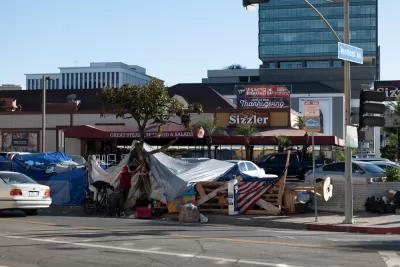The city of Los Angeles is scrambling to keep up with its growing homeless population, and increasingly leaning on punitive measures in response to the crisis.

“The Los Angeles City Council on Tuesday instructed its lawyers to draft a major change to the city’s anticamping ordinance, barring homeless encampments within 500 feet of schools and daycare centers,” report Benjamin Oreskes and David Zahniser for the Los Angeles Times.
The ordinance is in motion after Alberto M. Carvalho, superintendent of the Los Angeles Unified School District, urged the City Council to adopt the measure.
According to the article, the ordinance is caught up in the politics of the local election set for June 7. All of the councilmembers currently in contested races for re-election voted in support of the ordinance.
Oreskes and Zahniser also report that the ordinance “would represent a dramatic shift in the city’s approach to homeless encampments, rewriting a key aspect of an ordinance that was finalized only last summer following weeks of contentious debate.”
“The existing anticamping ordinance allows the council to prohibit camping on sidewalks around parks, libraries and schools. However, enforcement cannot occur until the council has reviewed a specific location and voted to give the go-ahead to clear it,” explain Oreskes and Zahniser.
A recent Times investigation revealed uneven enforcement of the measure. Los Angeles, home to the largest population of people experiencing homelessness in the United States, has been struggling to find the resources to support their city’s most vulnerable residents. A controversial decision to forcibly remove a homeless encampment from around Echo Park Lake in spring of 2021 still reverberates through the politics of the city. While the city has made progress in creating tiny home villages for people experiencing homelessness, advocates question the effectiveness and the conditions of the villages.
FULL STORY: L.A. City Council seeks to ban homeless encampments near every school, daycare center

Planetizen Federal Action Tracker
A weekly monitor of how Trump’s orders and actions are impacting planners and planning in America.

Chicago’s Ghost Rails
Just beneath the surface of the modern city lie the remnants of its expansive early 20th-century streetcar system.

San Antonio and Austin are Fusing Into one Massive Megaregion
The region spanning the two central Texas cities is growing fast, posing challenges for local infrastructure and water supplies.

Since Zion's Shuttles Went Electric “The Smog is Gone”
Visitors to Zion National Park can enjoy the canyon via the nation’s first fully electric park shuttle system.

Trump Distributing DOT Safety Funds at 1/10 Rate of Biden
Funds for Safe Streets and other transportation safety and equity programs are being held up by administrative reviews and conflicts with the Trump administration’s priorities.

German Cities Subsidize Taxis for Women Amid Wave of Violence
Free or low-cost taxi rides can help women navigate cities more safely, but critics say the programs don't address the root causes of violence against women.
Urban Design for Planners 1: Software Tools
This six-course series explores essential urban design concepts using open source software and equips planners with the tools they need to participate fully in the urban design process.
Planning for Universal Design
Learn the tools for implementing Universal Design in planning regulations.
planning NEXT
Appalachian Highlands Housing Partners
Mpact (founded as Rail~Volution)
City of Camden Redevelopment Agency
City of Astoria
City of Portland
City of Laramie





























